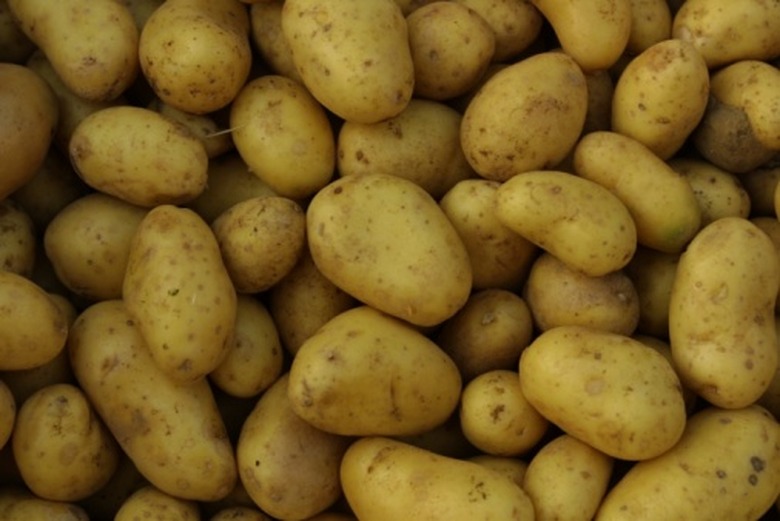Can I Put Old Potatoes In My Compost Pile?
Although some homeowners and gardeners shy away from the idea of adding old potatoes to their compost heaps, doing so serves as a convenient disposal method for spuds that are no longer suitable for table use. With proper preparation and regular compost maintenance, you can successfully turn old potatoes into finished compost.
Identification
Various signs that may indicate age has caught up with your stored potatoes include wrinkled skin, soft flesh and sprout development. Depending on storage conditions, some of these potatoes may even start to mold or smell badly as they begin to rot. Fortunately, none of these nose-wrinkling features preclude you from tossing the spuds into your compost pile. On the contrary, these physical changes indicate the beginning of the decomposition process — a breakdown of organic matter that occurs every day in your compost heap.
Features
Adding old potatoes to your compost pile allows you to convert inedible spuds into nutrient-dense humus. These starchy tubers contain a lot of moisture and — like other vegetable and fruit waste from your kitchen or garden — serve as an excellent source of nitrogen in the compost heap, says Deborah Martin, coauthor of "The Rodale Book of Composting." As a key compost ingredient, nitrogen-rich waste provides an essential food source for composting microbes, which use potato scraps and other nitrogen-heavy organic debris to enhance their growth and reproduction.
- Although some homeowners and gardeners shy away from the idea of adding old potatoes to their compost heaps, doing so serves as a convenient disposal method for spuds that are no longer suitable for table use.
- These starchy tubers contain a lot of moisture and — like other vegetable and fruit waste from your kitchen or garden — serve as an excellent source of nitrogen in the compost heap, says Deborah Martin, coauthor of "The Rodale Book of Composting."
Method
Taking the time to prepare old potatoes before adding them to your compost pile streamlines the composting process and minimizes potential problems. Chop or shred the potatoes into ½-inch-thick slices with a trowel or shovel, then sprinkle the tuber pieces across the top of the heap. Cover them with a 2- to 3-inch-thick coating of carbon-rich compost waste, such as straw, sawdust, shredded newspaper or wood chips. This speeds up the compost process by making the nitrogen-rich waste more readily available to the oxygen-loving compost microbes at work in your compost heap.
Considerations
When you add old potatoes to your compost pile, ensure the nitrogen-heavy waste — including the potatoes — doesn't account for more than half of the total waste in the heap. The rest of the waste should consist of carbon-rich organic materials, which provide the composting bacteria with the energy necessary to break down all of the biodegradable materials. For quicker composting, keep the compost pile about as wet as a wrung-out kitchen sponge and mix the waste with a manure fork or garden rake once or twice weekly to introduce plenty of fresh oxygen.
- Taking the time to prepare old potatoes before adding them to your compost pile streamlines the composting process and minimizes potential problems.
- When you add old potatoes to your compost pile, ensure the nitrogen-heavy waste — including the potatoes — doesn't account for more than half of the total waste in the heap.
References
- "The Rodale Book of Composting"; Deborah Martin, et al.; 1992
- "The Complete Compost Gardening Guide"; Barbara Pleasant, et al.; 2008
